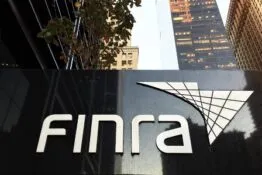
Michael J. Russo, of Melville, New York, a stockbroker with Global Arena Capital Corporation, was fined $35,000.00, and suspended for one year from associating with any Financial Industry Regulatory Authority (FINRA) member firm in any capacity after consenting to findings that he sent false and/or misleading statements to prospective customers regarding investment opportunities; and also made false statements to FINRA upon investigation into his misconduct. Letter of Acceptance, Waiver and Consent, No. 2013037235103 (Apr. 29, 2016).
According to the AWC, between October 19, 2011 and July 11, 2012, Russo had transmitted a minimum of fifteen email communications to clients and prospective clients concerning investment opportunities. FINRA found that statements made to customers by Russo were unwarranted and exaggerated, and ultimately in violation of NASD Rule 2210(d)(1)(B).
The AWC stated that in a minimum of two e-mail communications, there were bogus investment performance predictions – which was a violation of NASD Rule 2210(d)(1)(D). Apparently, another three e-mails crafted by Russo, according to FINRA, did not enable investors to have an adequate basis to properly evaluate the investment opportunities or other services. FINRA found Russo to be in violation of NASD Rule 2210(d)(1)(A).
More particularly, the AWC stated that Russo’s e-mail communications contained claims that if a prospective client were to speak with Russo or acquiesce to a transfer of accounts into his firm, Russo would provide exceptional returns. FINRA stated that in one case, Russo claimed to be capable of doubling an investor’s assets, at minimum, if customers’ invested in a select investment.
Russo allegedly told a firm customer that Russo could garner a profit of $1,000,000.00 if shares were purchases in select securities. In another case, Russo claimed to be capable of increasing a customer’s investment balance by 50% by year-end if the customer(s) agreed to transfer accounts to Global Arena.
The AWC further stated that Russo led customers to believe that their prospective investments would be safe because of the firm’s insurance policies covering the customers’ losses for a greater amount than what would be provided through SIIPC coverage. Yet, Russo apparently failed to explain what limitations were placed on insurance, or inform investors that their typical investment losses were not actually covered.
In another case, FINRA found that Russo made unwarranted and exaggerated statements concerning a proposed bond investment. Apparently, in his communications to a client, Russo greatly overvalued a bond issued through a financial institution in Europe, and inappropriately projected how the bond would perform. Russo apparently claimed that the firm customer, over the course of four and one-half years, could expect to receive a one-hundred and fifty percent investment return.
FINRA noted that Russo failed to inform such investor about the entity’s name which issued the bond, the bond’s yield, or other risks associated with such investment. As such, FINRA found that Russo did not provide the investor with an adequate basis to evaluate the investment opportunity.
FINRA found that as a result of Russo’s aforementioned communications, he had violated NASD Rule 2210; particularly 2210(d)(1)(D), 2210(d)(1)(A), and 2210(d)(1)(B). FINRA found that Russo violated FINRA Rule 2010 as well.
Public disclosure records reveal that Russo has been subject to seven disclosure incidents, five of which involve customer disputes. On May 19, 2016, Russo settled a customer dispute for $30,000.00 amid allegations of material omissions, misrepresentations, unauthorized trading. Other customers who lodged complaints alleged unauthorized trading and churning. Russo was terminated by Global Arena Capital Arena on November 11, 2013. Since then, the firm has been expelled by FINRA. Prior to his association with Global Arena, Russo was associated with ten different firms, at least half of which were expelled by FINRA.
Guiliano Law Group
Our practice is limited to the representation of investors. We accept representation on a contingent fee basis, meaning there is no cost to you unless we make a recovery for you. There is never any charge for a consultation or an evaluation of your claim. For more information, contact us at (877) SEC-ATTY.





